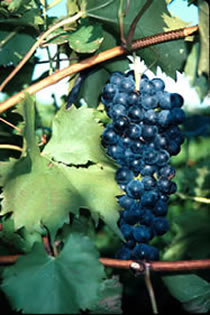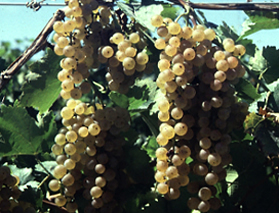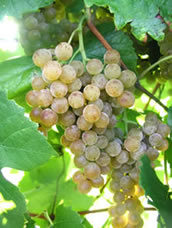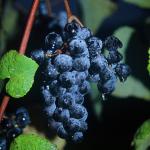Our Grapes
One of the most important considerations when planning the winery was choosing the types of grapes we should grow. After careful deliberation, we chose to raise Chambourcin,Vidal Blanc, Traminette, and Norton grapes. These particular grapes were chosen based on their hardiness and their proven ability to produce in our climate here in Dorchester County on the Eastern Shore of Maryland.
CHAMBOURCIN

Although not much is known about the birth of the aromatic Chambourcin, we do know that it was introduced to the public by Joannes Seyve in 1963, in the Loire Valley of France. It is a French-American hybrid that produces a blue-black fruit after a long growing season. Chambourcin vines have many assets that make it more resistant to disease, such as cold-weather hardiness and loose bunches. This versatile fruit lends itself to medium- to full-bodied complex wines, softer than Cabernet and Merlot, but spicy like Shiraz.
It imparts flavors such as raspberry, cloves, cherry, plum and tobacco, and is nicely complemented by dark chocolate. It is widely grown in the Loire Valley, France, and Queensland, Australia. Chambourcin grows well in the mid-Atlantic region of the United States and has gained popularity with wine lovers.
Lazy Day Rosé, our premier estate wine, is made exclusively from Chambourcin grapes grown at the Layton’s Chance vineyard in Vienna, MD.
Pair Chambourcin with spicy dishes, red meats, lamb, turkey and veal, and hearty pasta dishes featuring red sauce.
VIDAL BLANC

Better known as Vidal for its breeder Jean Louis Vidal, this French-hybrid was born of Ugni blanc (Trebbiano) and Seibel grapes in the 1930s. As a highly productive green grape, it is widely grown in Canada and the eastern United States. The robustness of the vine allows Vidal to survive in cooler climates, although it prefers (like many of us) a more moderate winter.
Its adaptable characteristics make it suitable for many types of wine, including off-dry Germanic style wines, sparkling cuvées, and simple table wines. Canadian wine makers even use it for Ice Wine, which is made from grapes harvested and pressed while still frozen. Vidal grows in long, loose clusters (see picture). They ripen slowly and steadily, to produce clean, citrus flavored wines. The fruity flavors range from grapefruit and lemon to melons and pears.
Pair Vidal Blanc with seafood dishes, shellfish, charcuterie boards, and spicy Thai, Mexican, or Cajun foods.
TRAMINETTE

If you are familiar with German wines, you may recognize a familiar flavor in a glass of our Traminette white wine. Both the name and the vine are offspring of the Gewürztraminer grape variant (itself a variant of Traminer). The vines produce large, loose clusters of light green grapes that ripen mid-season for a well-balanced, textured wine.
Traminette, the offspring hybrid that we grow here in Vienna, is sturdier and more “cold-hardy” than its more renowned parent. And yet, it exhibits many of the unique qualities — floral aroma, spicy flavor, and residual sweetness — for which Gewürztraminer is famous. These wines have a delightfully light and crisp expression, very similar to Germany’s most popular viticultural export, the Riesling.
Pair Traminette with hearty foods, including roasted beef and pork, sausages, and portobello mushrooms, and spicy dishes featuring chilis or Cajun spice. Also pairs well with firm, rich cheeses such as aged cheddar, gruyere or manchego. Can also work well as a dessert wine with fruits, cookies and cakes.
NORTON

Norton grapes are the oldest cultivated American variety known to exist. Originally grown by Dr. D.N. Norton of Richmond, Virginia, its origins are somewhat steeped in mystery. Some believe it to be derived from an extinct varietal of red grape called Bland, but others dispute that altogether. Regardless of its beginnings, the Norton is now incredibly popular with vintners. Norton is highly adaptable to growing conditions, especially here in the Mid-Atlantic states, and is durable, hearty and nearly immune to disease.
Norton wine production was wildly popular in Missouri in the late 1800s, but then was nearly eradicated during Prohibition as people pulled up their vines and replaced them with Concord grapes for use in jams and juices. Norton grapes are actually quite similar to Concord in that they are intensely ‘grapy’ in flavor, just slightly less sweet. It is widely accepted that Norton grapes work well in dry red wines and wines that are barrel aged.
Pair Norton with grilled salmon and blackened fish, BBQ and smoked meats (pulled pork, brisket, chicken) and venison, dishes featuring strong herbs and spices like rosemary, garlic, pepper, nutmeg. For desserts serve spiced cakes, dark chocolate and fresh berries.







